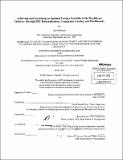Achieving and sustaining an optimal product portfolio in the healthcare industry through SKU rationalization, complexity costing, and dashboards
Author(s)
Hilliard, David (David John)
DownloadFull printable version (13.27Mb)
Other Contributors
Leaders for Global Operations Program.
Advisor
David Simchi-Levi and Scott Keating.
Terms of use
Metadata
Show full item recordAbstract
After years of new product launches, and entry into emerging markets, Company X, a healthcare company, has seen its product portfolio proliferate and bring costly complexity into its operations. Today, Company X seeks to achieve and sustain an optimal product offering that meets their customers' needs. Through a six-month research effort, we develop a process for stock-keeping-unit (SKU) rationalization to reduce SKU complexity while maintaining sales volumes. We, also, implement operational models to compute complexity costs associated with SKU complexity and employ SKU portfolio dashboards to monitor SKU development and govern SKU creation. This thesis discusses a process for applying these tools to any healthcare company. Through two case studies, we apply the rationalization process on one pilot brand and develop a dashboard to improve product portfolio management. We expect that the SKU rationalization process will release 38% of avoidable costs associated with the pilot brand. These case studies also provide insight into how to correctly diagnose the cost reduction opportunity associated with SKU complexity, as well as methods for a step-change improvement in lead-times and cost-reduction. Lastly, removal of complexity provides flexibility to capture other business opportunities.
Description
Thesis (M.B.A.)--Massachusetts Institute of Technology, Sloan School of Management; and, (S.M.)--Massachusetts Institute of Technology, Engineering Systems Division; in conjunction with the Leaders for Global Operations Program at MIT, 2012. Cataloged from PDF version of thesis. Includes bibliographical references (p. 76).
Date issued
2012Department
Leaders for Global Operations Program at MIT; Massachusetts Institute of Technology. Engineering Systems Division; Sloan School of ManagementPublisher
Massachusetts Institute of Technology
Keywords
Sloan School of Management., Engineering Systems Division., Leaders for Global Operations Program.